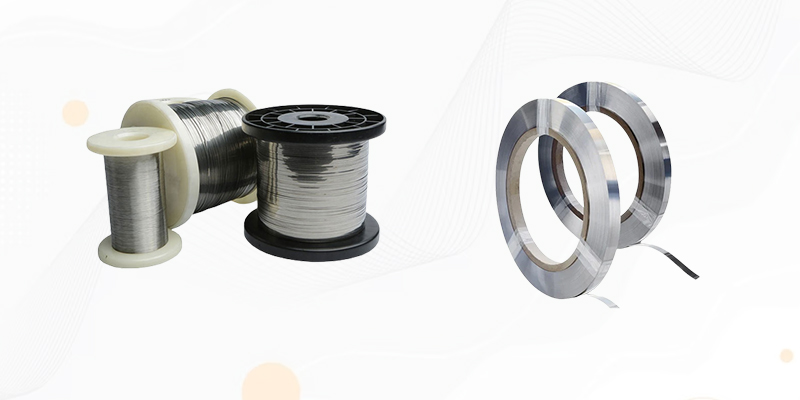
Resistance Wires and Strips
There are two main types of electric resistancealloys. Nickel-chromium (e.g. 80 Ni, 20 Cr) wasdeveloped around the turn of the century andwas soon used as heating element material inindustrial furnaces as well as in electric house-hold appliances.
In the thirties Kanthal introduced a newresistance heating alloy based on iron-chro-mium-aluminium with a longer life and a highermaximum operating temperature than nickel-chromium.
The two main types of alloys have their ownspecific properties, with advantages and dis-advantages, and are supplied in many differentgrades and forms. Kanthal manufactures bothtypes of alloys under the names NIKROTHAL(nickel-chromium) and KANTHAL (iron-chro-mium-aluminium).
In general KANTHAL is superior to NIKROTHAL in respect of performance andlife and is therefore nowadays a standardmaterial choice when it comes to metallic heating elements for industrial furnaces.
The most important advantages are :
- Higher maximum element temperature of1425°C 2600°Fcompared to 1250°C 2280°F
- Longer life (2–4 times)
- Higher surface load
- Higher resistivity
- Lower density
- No spalling oxide, which may contaminatethe goods and the furnace and also causeshort circuit or failure of elements and gasburners.
For the furnace user, using KANTHAL resultsin less material at a lower price and also – a longer life. Table 1 shows an example ofweight saving – and lower cost – obtained byusing KANTHAL instead of nickel-chromiumalloys. This lower element weight will alsoresult in considerable cost savings in the support system, because fewer suspensionhooks are necessary.
The NIKROTHAL alloy may have specialadvantages if you need a heating elementhaving very good mechanical properties in thehot state. KANTHAL APM has, however, creepstrength at elevated temperatures in the samelevel as NiCr 80/20.
Table 1. A 120 kW furnace equipped with R.O.B. elements. 3 elements of 40 kW each, 380 V.
| Element Data | NiCr 80/20 | KANTHAL AF |
| Furnace temperature, °C °F | 1000 1850 | 1000 1830 |
| Element temperature, °C °F | 1068 1955 | 1106 2025 |
| Hot resistance, Rw | 3.61 | 3.61 |
| Temperature factor, Ct | 1.05 | 1.06 |
| Cold resistance, R20 | 3.44 | 3.41 |
| Wire diameter, mm in | 5.5 0.217 | 5.5 0.217 |
| Surface load, W/cm2W/in2 | 3.9 19.9 | 3.98 25.7 |
| Wire length, m, ft3 elements | 224.9 738 | 174.6 573 |
| Wire weight, kg,lb3 elements | 44.4 98 | 29.6 65 |
Weight saving :
44.4 — 29.6 44.4 = 33%
98 — 65 98 = 33%
PROPERTIES OF RESISTANCE AND THERMOCOUPLE ALLOYS

Chemical composition and main characteristics of thermocouple alloys

Maximun operating temeratures

Send a message

